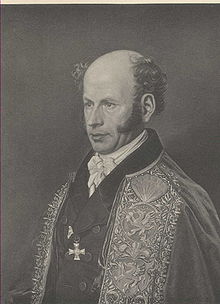- Christian Friedrich Hornschuch
-
Christian Friedrich Hornschuch (August 21, 1793 – December 24, 1850) was a German botanist born in Rodach, Bavaria.
In 1808 he started his career as an apprentice at a pharmacy in Hildburghausen. In 1813 he moved to Regensburg as an assistant to botanist David Heinrich Hoppe (1760-1846), and afterwards worked as an assistant to Heinrich Christian Funck (1771-1839) in Gefrees, where he performed research of mosses (Bryopsida) native to the Fichtelgebirge. In 1816 he accompanied Hoppe on a botanical expedition to the Adriatic coast, and after a stopover in Coburg (1817), the two men continued their research in Tyrol and Carinthia. Later he worked as a "botanical demonstrator" at the University of Greifswald, and for a period of time studied with Carl Adolph Agardh (1785-1859) from the University of Lund.
In 1820 he was appointed associate professor of natural history and botany, and director of the botanical gardens at the University of Greifswald. In 1827 he attained the title of "full professor".
Publications
Hornschuch specialized in the field of bryology, and with botanist Christian Gottfried Daniel Nees von Esenbeck (1776-1858) and engraver Jacob Sturm (1771-1748), he was co-author of Bryologia Germanica (1823-1831). He translated a number of Danish and Swedish works, and was the author of the following publications:
- Tagebuch auf einer Reise nach den Küsten des adriatischen Meeres (Diary of a Journey to the Shores of the Adriatic Sea), 1818
- De Voitia et Systolio. novis muscorum frondosorum generibus (1818)
- Einige Beobachtungen über die Entstehung und Metamorphose der niederen vegetabilischen Organismen (Some Observations on the Formation and Metamorphism of the Lower Vegetable Organisms). In: Flora (1819)
References
- This article is based on a translation of the equivalent article from the German Wikipedia.
- University of Bonn, Bryology
- Botanical Database, C.F.Hornschuch



This article about a German botanist is a stub. You can help Wikipedia by expanding it.

